Posts Tagged ‘PEN International’
PEN Pregunta: Corruption, Violence, Impunity: What Can Writers Do?
PEN International and its Latin American and North American PEN Centers gathered this past week in Central America and in Mexico City for the third PEN Americas Summit to address the challenges to freedom of expression and the crimes against writers. The region, in particular Mexico, is one of the most dangerous in the world for writers and journalists who are killed, disappeared, attacked and threatened with virtual impunity.
In Mexico over 100 journalists have been murdered since 2000; 25 have been forcibly disappeared and hundreds are attacked and threatened each year while their attackers remain free.
During the Summit PEN identified the structural issues impeding freedom of expression, including the weakness within the Office of the Special Prosecutor for Crimes Against Freedom of Expression, the use of criminal defamation laws, the barriers to entry and lack of diversification within the Mexican news media, the close relationship between much of the media and the Mexican government and the manipulation of advertising payments from the government to media as a reward for positive coverage.
Developing recommendations, PEN officials followed up by meeting with government ministers. Most important the writers in the region will follow up with each other advancing the narrative in their countries which included Argentina, Brazil, Guatemala, Haiti, Honduras, Mexico, Nicaragua, Canada, and the U.S
The Summit ended in Mexico City with a public Pregunta,—a brief statement and question from each of the participants to generate discussion.
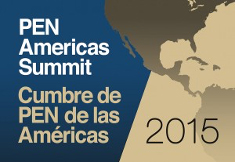 Question: What can a gathering of writers do in the face of killings, disappearances and attacks on journalists in Mexico?
Question: What can a gathering of writers do in the face of killings, disappearances and attacks on journalists in Mexico?
Writers’ tools are words and narrative. The narrative in Mexico has deteriorated with journalists and writers attacked at a rate of almost one a day and many killed while their attackers live with impunity. What can a room of writers do? We can begin by helping change the narrative.
PEN was founded by writers in Europe after World War I who wanted to charge the narrative of nationalism that had led to that war.
In my years working in PEN, I have witnessed societies change and freedoms expand, in part because writers and journalists advanced the narrative of the individual’s right to free expression, the right to imagine different societies and to live without fear.
When I began in PEN, South Korea had prisons filled with writers. That is no longer the case. Czechoslovakia had major writers in prison as did most of Eastern Europe. Societies can change. Writers can help lead the way inspiring and re-imagining the narrative until it becomes reality.
Today much discussion is about the brutality of ISIS. The brutality—the beheadings, murders, disappearances—that are happening in Mexico are not a global focus. Today we can witness and bring focus and help re-imagine the outcome.
Question: What can writers do in the face of killings, disappearances and attacks on journalists? Please share your ideas below.
Times and Tides
Anniversaries abounded this past week:
—November 11: The hundredth anniversary of World War I was perhaps the most significant. Since I wasn’t alive then, I have no personal memories, but I have an appreciation of its significance in all the years that followed and influenced my life. I also appreciate the misreading and historic mistakes that led so much of the world to war.
—November 9: The twenty-fifth anniversary of the fall of the Berlin Wall—I was around for that. A few months afterwards our family moved to Europe, and I took my children to East Berlin where we walked across Checkpoint Charlie and knocked down the wall ourselves. We still have a bag of the concrete from the wall in a cabinet in our home; the most artistic slabs with colored graffiti we mounted under plexiglas and shared with friends.
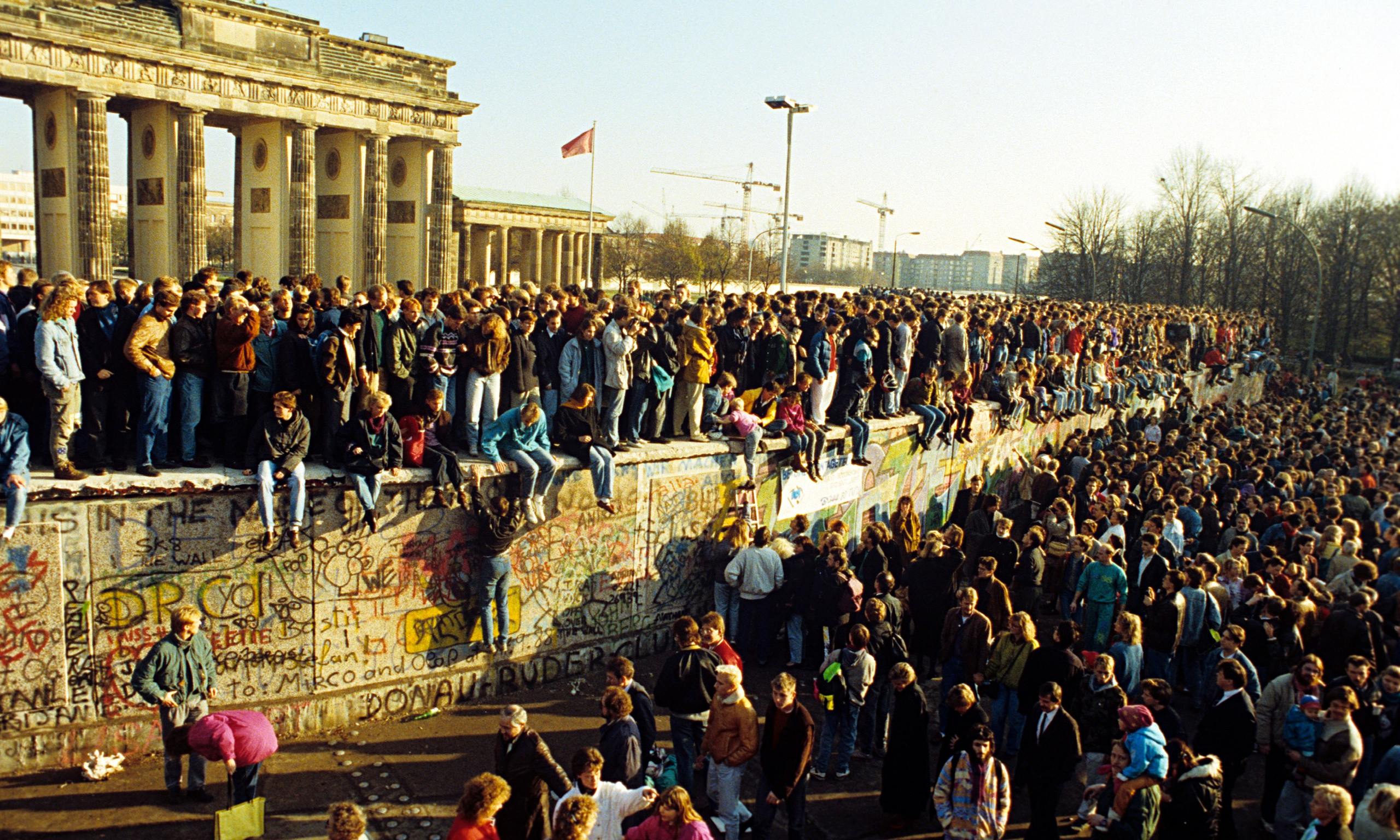
—November 8: The tenth anniversary of the second Battle of Fallujah is very personal. We had a son at the front of that battle who survived and is still processing the impact on him and his friends and the country. He has developed into a beautiful writer who tells and has published his own essays and stories. His first novel Green on Blue will be published by Scribner’s this February. Not noted as widely at the time ten years ago were the battles of the civil war in the Ivory Coast. During the Battle of Fallujah I was with African PEN centers in Dakar, Senegal planning a PEN Congress. The headlines on the front pages there were from the Ivory Coast, not Iraq. My heart at the time was stretched across continents. In quiet moments I can still feel…or is it hear?…this beating of the heart.
—And finally this fall celebrated the fiftieth anniversary of my own high school graduation—an unexpected gathering of friends, most of whom I hadn’t seen in a quarter and some in half a century. We found the friendship and goodwill were what had lasted, had roots and still flourished among us.
This flowering and expanding of life and the heart is what I take away. The walls that fall between us are still challenged by the battles fought among us. History repeats or teaches. There are no simple lessons, but to the extent we find ways to break down the walls and end the battles, we hope. Hope after all is still a threshold of history.
PEN on the Plains of Central Asia
PEN International’s 80th Congress opened with galloping horses across the majestic plains of Central Asia’s Kyrgyzstan this past week when the 200 plus delegates from 73 PEN centers around the world encountered “Kurmanjan Datka: Queen of the Mountains” the epic new film featuring Kyrgyzstan’s national heroine. The cinematically stunning drama spanned the late18th to 19th century when the modern nation formed, led by a woman—wife, widow and mother—in a time when women had no rights, when enemies threatened on all sides. The drama ended with Russia’s annexation of the region.
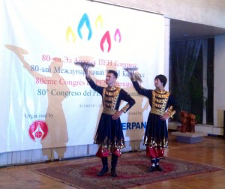
A hundred years later PEN delegates gathered in Bishkek for PEN’s annual Congress whose theme My language, my story, my freedom included discussion, debate and advocacy on issues of free expression. PEN called for release of Uzbek writer Azinjon Askarov from a Kyrgyz prison, Vladimir Kozlov from Kazak prison and Ilham Tohti, who was recently given a life sentence in China for alleged “separatism.” These three individuals were featured with empty chairs at the Congress and represented the more than 900 writers, journalists, publishers, editors and bloggers listed in PEN’s case list and for whom PEN advocates.
Kyrgyzstan is considered the freest of the Central Asian republics of the former Soviet Union, the only republic that could have hosted a PEN Congress, but it is still challenged with ethnic conflicts and with repression of certain minorities, including those from the LGBT communities. The influence of the Russian Federation, including its Law of False Accusation and criminal defamation and laws against “gay propaganda,” the influence of radical Islam and ethnic conflicts affect free expression in the country, according to Marian Botsford Fraser, the Chair of PEN International’s Writers in Prison Committee.
Before the Congress, PEN International’s President John Ralston Saul and a delegation visited neighboring Kazakhstan and met with the President’s office there to present PEN’s concerns, especially for imprisoned writers Vladimir Kozlov and Aron Atabek. In Bishkek a delegation met with the President of Kyrgyzstan on PEN’s issues and with the federal Prosecutor on the case of Azinjon Askarov.
PEN held panels and discussions on LGBTQI rights, on surveillance, on criminal defamation, and on linguistitic rights. Resolutions on free expression and the cases of imprisoned and threatened writers were passed relating to Azerbaijan, China, Tibet, Cuba, Ethiopia, Eritrea, Honduras, Iran, Iraq, Kyrgyzstan, Mexico, North Korea, Russia, Syria, Turkey, Ukraine, and Vietnam.
PEN voted in four new centers—Liberia, Honduras, Wales, and an Eritrean center in exile, whose member reported on the many writers who are in prison and who have died there, bringing the total number of centers to 147 around the world.
In the capitol of Bishkek galloping horses are now replaced by ever present taxis—used cars from Europe and Japan with steering wheels on both the left and the right hand sides. Monuments and buildings from the Soviet era are strained with wear though guards still goose step around their peripheries. Members of Central Asian PEN welcomed the delegates with hospitality, with literature, with traditional songs and dance, with modern cinema about the past and with a hope of embracing broader freedoms in the future.
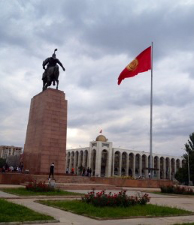
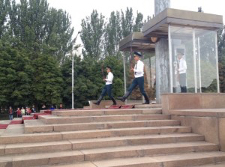
Women’s Progress: The Power of a Bridge…and a Double Yellow Line
(Below is an abridged version of a talk I gave at Johns Hopkins University on Women’s Day, March 8 to an audience of vibrant students gathered for a day-long Summit for Emerging Women Leaders, sponsored by the Women’s Initiative for Social Equity.)
I arrived at Johns Hopkins as a graduate student in the Writing Seminars straight from a small college in the Midwest with a combination of confidence and concern that Hopkins had made a mistake admitting me. I was sure the other students would be more widely read and experienced. I spent the whole spring and summer when I wasn’t working, reading. That fall at Hopkins I was assigned the very first seminar paper focused on a controversial novel at the time The Confessions of Nat Turner by William Styron. The controversy arose around whether a white novelist could or should take on the first person narrative voice of a slave. I’ll get to my answer later in this talk. I got an A on the paper and knew I was going to be all right. Hopkins let me know I could meet the challenge. That was my first lesson.
When I arrived on campus, there were no women undergraduates. At the time my social conscience was focused more on civil rights than women’s rights so while the role of women in the larger society concerned me, I think I viewed the ratio at Hopkins as a social advantage. But here comes my next big lesson. When I had a disappointment on the romantic front and was feeling low, a voice in my head challenged: “If you have time to mope about, you have time to reach out and help someone!” That voice was not echoing my parents; they would be kinder. It was my own voice taking me to task, and so I listened.
I went to the Hopkins Tutoring office and signed up to tutor in the community. I was assigned a family who lived in West Baltimore and later moved to the projects on Druid Hill Ave. One evening a week I drove over to their house and tutored the mother of five children, ages 4-12. She only had an eighth grade education and wanted to read better. I also helped the children with their homework. The 10-year old daughter and I shared the same birthday. I tell you that because I’m still in touch with this family, and recently when the mother and I were talking on the phone after that birthday had passed, she asked me: “Do you know how old I am?” And I answered, yes, you’re ten years older than me and your daughter is ten years younger, and none of us should be counting anymore.” We both laughed. Three of those children went on and graduated from college and the oldest son finished high school and is a grandfather himself now. One of the treasures of my time at Hopkins was getting to know this family and having them part of my life over the years though we don’t see each other as much lately. My Hopkins education opened worlds to me of all kinds, showing me I would be okay in the larger intellectual world as well as in the inner city of Baltimore.
When I arrived at Hopkins, I thought I was entering a two-year program only to find out I would have a Master of Arts in nine months and had to get a job. No one hired aspiring novelists, but during college I’d been editor of the campus newspaper and each summer worked as a journalist so I applied to a leading international newspaper The Christian Science Monitor in Boston where I’d published a few articles. When the editor-in-chief met with me, he opened the interview, “I hear you were a thorn in the side of your college.” After I explained the issues I’d written about—the need to recruit minority students, the rights of workers on campus, removal of restrictions on women, protests abroad against the Vietnam War—he said, “You’re hired!”
But I was not hired to start tracking down important news stories but to be a copy kid. A copy kid in those days was the person who ran copy between departments—this is before the internet—and generally was at the beck and call of editors to do whatever they needed including getting them coffee and when work was slow filling the rubber cement jars because back then the pages of a news story were typed and then glued together in one long streamer and dropped in the copy editor’s box. But I’m a writer, I wanted to protest. I have a masters from Johns Hopkins University! The editor saw the disappointment on my face and added, if you show us what you can do, you’ll get promoted to reporter. So I took the job.
Here is the third important lesson which includes advice from my father: Don’t worry where you start in a job, just get to the place you want to be with smart people around you, and you’ll learn and rise to your level of excellence.
I spent every minute when I wasn’t transporting copy or coffee working on my own stories…in the evenings, every weekend. After a month I handed in a four-part series on Cambridge housing, examining the causes, effects, and solutions to what I had identified as a problem. The New England news editor accepted the four long stories, put them on his pile of stories to read, and that was that. I don’t recall how long it took him to read them. They never ran in the newspaper. I now realize how unlikely it was the paper would give space to a four-part series on such a local issue. But after seven long weeks, I was promoted to reporter.
Looking back, I can see that the editors were evaluating how hard I would work, how honed my skills were and perhaps whether I had the humility to do what was needed in a newsroom. Actually I don’t know if they were evaluating humility, but that was another important lesson for me. The experience deepened my appreciation of everyone around me, including those who cleaned up the newsroom at night when I was still working, those who set the type, those who delivered supplies. I appreciated that not everyone had his dream job.
The journalist’s mantra is: who, what, when, where, why, and how. These are the questions all journalists try to answer in their stories. In one’s own life I think the most important of those questions is who. What you do, where you do it, and when may be influenced, sometimes even dictated, by the actions of others, but no one can dictate who you are. You are responsible for the values and qualities of character you bring to the world. These will open doors for you.
I’ll end my career journey here, addressing the early years where most of you are. I broadened my work as a writer, expanding from journalism into fiction. Over the years I’ve also had many opportunities to go into the world to work on issues of human rights, education and refugees.
A number of years ago I attended an international conference on human rights in Katmandu, Nepal. On the flight there, the airplane suddenly lost altitude and then dropped again. The clouds were so thick that it looked as if we were flying through cotton wool as the rain and wind hit and shook the airplane. Around us, though we couldn’t see them anymore, rose the ranges of the Himalayas. The captain ordered all passengers and flight attendants to take their seats immediately and fasten their seat belts. I found myself hoping that the captain, whom I had never met or even seen — but in whose hands I’d put myself — had been trained well and had taken his training and his subsequent flying very seriously. I hoped that he had studied hard, hadn’t cut corners, and didn’t perform at 80 percent of capacity when the highest performance was now required of him. I also hoped those on the ground who maintained this plane had taken their tasks — even the smallest — just as seriously. The plane diverted to Delhi, and we waited out the storm on the runway, then finally landed in Katmandu.
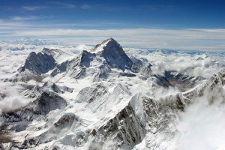
A similar, though less harrowing, journey occurred just a few weeks ago when I was driving over the Chesapeake Bay Bridge in a fog so heavy that I could see only a few feet in front of me. I was surprised the bridge was open. All I could see was a foot or two of a double yellow line. I trusted that the architects and builders had constructed a sturdy bridge, but most of all I trusted that line, that it would keep me on the path, that whoever painted it—and that may not have been his or her dream job at the time—executed it accurately, and it would not veer off to the edge or into other lanes of traffic.

Over the years I’ve been outspoken and advocated for women’s voices in all the venues where I’ve worked. But today I also want to emphasize that each task in our lives is important even when we don’t find ourselves at the pinnacle of where we would like to be. That doesn’t mean we don’t continue to work hard, strive, advocate, even protest, but our journeys are formed by the dedication we bring to each activity, even if, at the time, we may not see how the activity links to a greater plan and purpose.
As a writer I’ve worked with an organization called PEN International on behalf of writers who have found themselves threatened or imprisoned, or who have disappeared or even been killed because of their ideas and their writing. The work has involved some heart-breaking stories, but it has also involved stories of real courage. Many of the individuals survived because they refused to yield to the harsh realities they found themselves in. Instead they dwelled in their imaginations, and they held to their inner dignity.
I’ve also had the privilege over the years of being engaged with education projects in some of the more problematic regions of the world, visiting school rooms where the learning materials are hung from the ceilings of the huts which have no doors so the cattle who wander in and out don’t trample them, school rooms under trees. The mothers and fathers of the children in these schools sacrifice so their children can learn and have a fuller future.
Recently I visited refugee centers and camps in the four countries—Iraq, Jordan, Lebanon and Turkey—bordering Syria where the refugee crisis is the largest in a generation. As many as three to four million people are expected to have fled Syria by year’s end because of the violence of the three-year old civil war. The flood of people into countries which have their own problems seems overwhelming.
What can one person do in any of these challenges? Individually, a limited amount—witness, tell the story—but collectively we are all citizens of the world, and that world is a function of how we behave and also how we think about it and act towards our fellow citizens.
–Are we up to the task? Hopkins taught me, yes, I am.
–Does the plight of the world depress—yes, it can, but I learned at Hopkins that if I have time to be depressed, then I also have time to get up and reach out.
–Is what we do important enough to make a difference? Maybe. It can be. But whatever path or avenue opens, we can act with vigor and integrity—whether flying the airplane or tightening the screw on the wheel, whether designing the bridge or painting the line on its road. Whatever the task, others will depend on how well we do it. The question is do we have the courage and also the humility to do it with a full heart? I think the answer is yes.
My answer on that seminar paper years ago was also yes. A novelist should/could take on a voice very different from his or her own. That is what artists do. But success depends upon how well and carefully one listens and observes and empathizes with those who are not oneself.
In my generation the rights of minorities and women and others expanded significantly, at least in the U.S. My final observation today is: Society can change for the better and you can be part of that.
Qatar: A Poet in a Desert Cell
(This piece also appears on GlobalPost.)
DOHA, QATAR — We stood outside the guard house in the desert wind on the outskirts of the city. Doha Central Prison rose on the horizon of a barren, rock-strewn landscape, electric wires cutting across a cloudless sky. We had been told we had permission to visit Qatari poet Mohammed al-Ajami, whose 15-year sentence for two poems had been confirmed the previous day by the high court.
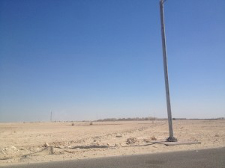
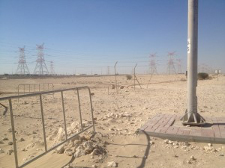
For five hours we stood, paced, sat in broken chairs, negotiating on mobile phones with the Attorney General’s office. The prison authorities had not received the request for our visit. The guards changed twice while we waited, guards from different nationalities as are most of the workers in Qatar. They were friendly, shared fresh oranges with us as the hours passed, but had no authority to help.
Inside the prison members of al-Ajami’s family were visiting him and knew we were out there. Al-Ajami knew we were there and wanted to see us. No one had gotten this far, the family later told us. But in the end we were denied.
For the last two years Mohammed al-Ajami has been in solitary confinement with limited access to visitors. A known poet in the Gulf and the father of four, al-Ajami was a literature student at Cairo University in 2010 when he recited a poem in his apartment among friends, a poem that allegedly criticized the Emir. The poem was in response to a poem by a fellow poet, but one of the students in the apartment recorded al-Ajami and uploaded the reading on YouTube. According to al-Ajami’s lawyer Dr. Najeeb al-Nauimi, a former Justice Minister in Qatar, the poem was spoken in a private setting and violated no law. Another of al-Ajami’s poems “Jasmine” was circulated on the internet and expressed support for the uprising in Tunisia and criticized all the Arab regimes.
Sixteen months later, al-Ajami was summoned in Doha and arrested, eventually charged with “encouraging an attempt to overthrow the existing regime,” “claiming that the Emir misused and not abided by the Qatar Constitution” and “criticizing the Crown Prince,” who has subsequently become the Emir. Al-Ajami was sentenced to life imprisonment after a trial held in secret where the Investigating Judge, a non-Qatari, was also the Chief Judge. [The Emir appoints all judges on recommendation from the Supreme Judicial Council, 75% of whom are foreign nationals, dependent on residency permits.] Later on appeal, Al-Ajami’s sentence was reduced to 15 years.
As representatives of PEN International and PEN American Center we—two American women—had come to Doha to argue for the release of Mohammed Al-Ajami, but by the time our planes landed, the court had already upheld the 15-year sentence. All judicial appeals were now exhausted.
A country of two million people, but with only 250,000 citizens, Qatar is one of the, if not the, richest nation per capita. During his reign the former Emir set a course of modernization and brought reform to the government, brought institutions of higher education to the kingdom and developed programs in the arts and set up a Center on Media Freedom. The West looks to Qatar as a leader in the region. The imprisonment of a poet on an offense of lese majeste has confounded many though in an interview, the Prime Solicitor General insisted the charges were not about freedom of speech but were brought because the poet publicly offended people and urged the overthrow of the government.
In Qatar itself the case has received little coverage. The news media is owned by the government and the Emir. Those familiar with the ways of the kingdom say the only recourse now for al-Ajami is a pardon by the Emir. However, if an apology is necessary for that pardon, a standoff may occur. According to al-Ajami’s lawyer, the poet has questioned why he should apologize for having spent the last two years in solitary confinement for sharing a poem in a private setting. His lawyer notes that Al-Ajami has had his career disrupted; he has missed seeing his family for two years, including missing the birth of his youngest child.
As I flew out of Qatar, I stared at the desert below now filled with sky scrapers and modern museums rising from the land. I considered the math. Over 90% of the jobs are occupied by men and women of other countries who have no rights of citizenship and can be deported. Only one in ten people are citizens; half of these are women, who have limited rights; over a quarter are children and the elderly. The country is run by a very small minority. I questioned whether the math was on the side of history.
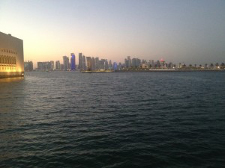
Extensive gas reserves developed in the 1990’s have given Qatar its huge income and given the country a seat at the leadership tables of the region and the globe. But if the country puts its poets in prison, one must wonder. On the other hand, if the new Emir, just 33 years old, educated in Britain, pardons poet al-Ajami unconditionally as PEN urges, then perhaps the curve of history will extend outwards, at least for a while.
[Mohammed al-Aljami is an honorary member of PEN American Center. PEN’s representatives in Doha were Joanne Leedom-Ackerman, Vice President of PEN International and Trustee of PEN American Center, and Sarah Hoffman, Freedom to Write Coordinator for PEN American Center.]
To sign a letter urging a pardon for Mohammed al-Ajami, click here.
The Last Colony?
The desert stretched out like a beige patterned quilt as far as the eye could see. The pattern looked like birds’ wings or boomerangs in the sand as the plane descended, then the swirls of sand resolved into rocky ground. In the distance a few concrete buildings rose around the pink watch tower of the airport as I landed in Laayoune in the Western Sahara.

A 103,000 sq mi stretch of desert and coastline twice the size of England, larger than all of Great Britain, the Western Sahara is called by some “the last colony.” Extending south between Morocco and Mauritania with almost 700 miles of coast edging the desert, the region has been in a political quagmire for the last four decades. Spain and Mauritania renounced their claim to the area in the late 1970’s, leaving only Morocco and the indigenous Sahrawi’s in dispute.
In February, 1976 the Sahrawis declared a sovereign state, Sahrawi Arab Democratic Republic (SADR). For almost 16 years (1975-1991) Moroccan forces and the Sahrawi indigenous Polisario Front engaged in armed struggle. For the next 22 years the United Nations has overseen a political limbo. A referendum on independence was promised but has been stalled year after year.
I first became interested in the Western Sahara in the early 1990’s when chairing PEN International’s Writers in Prison Committee. The stories of torture and the conditions in the prisons of the Western Sahara were as grim as any I encountered. Many died and never made it out of the prisons, which were run by the Moroccan security forces. There were also bleak reports from prisons run by the Polisario rebels. I still remember stories of writers who took their bar of soap they were given each month and wrote poems on their trousers. The writers then memorized each other’s poems as a way of staying sane. They also scoured the prison yard in the one hour they were given each day and found scraps of paper and used coffee grounds to write their forbidden verses. Their stories demonstrated how one endured—through fellowship and a flight to the imagination.
Since that time the armed conflict has officially ceased; Morocco has granted amnesties, and most of the prisons have allegedly been closed, but there are still reports of “black jails” with grim conditions even in the capital. There are large areas where no one is allowed to visit.
My visit was brief, the visit of a tourist. I hired a taxi recommended by the small parador where I stayed, the hotel itself recommended by a friend of a friend who worked at the U.N. My driver spoke Spanish and Arabic, some French and little English. I speak English, some French, less Spanish and very limited Arabic, but we managed. I asked him to show me around the city then take me into the desert and then to the beach.
Those living in Laayoune are living their regular lives, women in long djellabas with head scarves, children going to school—you can hear their chatter and laughter on the streets—men also in djellabas or slacks selling in the shops and markets. But the area is a high security zone. The U.N. and the Moroccan security are present, and travel is restricted. No one is allowed too far east where a giant man-made sand berm separates the Moroccan-dominated region from the smaller Saharwi Polisario region near Algeria. Land mines are said to be scattered throughout the no man’s land in between.
In my 24 hours in the capital Laayoune, a city of around 200,000 with 70% of the Western Sahara’s population, I was stopped at six checkpoints. Two were on the way to the desert where a two-lane road stretched through the sand and rock. Any other journey in this area would need to be made with an off road vehicle or on a camel, but I saw only a few camels.
At one point on the way from the desert to the beach, I was delayed for 45 minutes with my passport examined twice. Everyone was friendly; I was friendly. A policeman with a moustache wearing a crisp blue uniform with white belt and military hat, looking very French (though the larger influence in the Western Sahara is Spanish), stood in the middle of the highway to stop us then came over to the taxi.
“Bonjour,” he smiled at me. “Bonjour,” I replied. “Passport?” he asked. I handed him my American passport. My driver had already called another policeman whom we waited for at a designated place in the city to get permission to go to the beach. At the beach are the fish processing plants and a phosphate plant as well as a promenade and beach and the Atlantic. We were given permission so I’m not sure why we are being stopped.
“Profession?” he asked. “Ecrivan,” I answered. “Journaliste?” he asked with suspicion. “No…ecrivan…romans.” I smiled. He smiled. He took my passport and went back to his car where he and the driver conferred for fifteen minutes. I watched them in the side mirror and wondered if I should get out of the car but decided I should stay inside. He returned to the car and gave me back my passport. He smiled I smiled. But still he didn’t let us go.
Meanwhile cars and a few trucks passed by without being stopped. They were driving south either towards the beach or all the way down the highway to Mauritania, over 600 miles away. I’ve been told this is a smugglers’ route. I wondered what traffic might have passed while I was being checked.
The driver returned and asked for my passport again. Another 15 minutes went by. I continued to watch them in the rearview mirror. Finally I got out of the car. I didn’t walk towards them. I just stood leaning against the taxi in the wind—a lone American woman traveling in the desert, sitting in the front seat of the taxi because it gave me a better view. I was probably not a sight they were used to. After almost 45 minutes, we were finally released. I don’t know what the conversations were. The driver told me it was about his license plate; one of its numbers was wrong; he was given a fine. Then why did they need my passport…twice, I asked. But he had no answer I could understand. Instead he took me to lunch at a restaurant on the beach, which I thought was either his father’s or his father worked at, then he invited me to his home, where he told me his mother had made me tea. His mother didn’t appear, but a tea service was set up, and he served me the delicious sweet mint tea in an elaborate Moroccan tea ceremony. When I paid him at the end of the day, I tipped him enough to pay the fine though I didn’t really know what happened, but we were smiling.
At the hotel, the U.N. representative who is a friend of a friend picked me up to go to the airport. Coincidently he was on the same flight back to Casablanca, where he would then head to the Azores. He was preparing for a meeting that would happen later in the fall. Fifteen refugees living on the Moroccan side of the sand berm will meet with refugees living on the Algerian side to discuss their lives. Observing them will be three Mauritanian anthropologists. The hope is that these meetings, which have occurred over the years, will help form bonds within the region. The larger hope for the region is that eventually real peace will break out. The topic to begin the discussion at the gathering will be: The Camel.
Two Voices Behind the Iron Doors
(In the past weeks I was brought to focus again on the situation of two writers in prison, one in China, the other in Turkey, both countries that have consistently challenged and imprisoned writers. In China the hope for expanded freedom of expression that came with the Olympics and China’s engagement with global institutions has not materialized, and Chinese writers remain in prison with long sentences. The situation in Turkey for a while was improving, but in the past year arrests have again escalated.)
Voice in China
I had dinner recently with three colleagues of Liu Xiaobo, the Nobel laureate and writer currently serving an 11-year sentence in a Chinese jail. Two of his friends, Shen Tong and the other friend arrived in the U.S. around the time of the Tiananmen Square protests in 1989, but the younger best-selling writer and democracy activist Yu Jie didn’t leave China until January, 2012 after being detained and tortured and put under house arrest. He now lives in Virginia.
Yu Jie consulted with Liu Xiaobo during the writing of Charter 08, the manifesto calling for democracy in China which resulted in the imprisonment of Dr. Liu. He and Liu Xiaobo also co founded the Independent Chinese PEN Center, and Yu Jie has written a biography of Liu Xiaobo.
At a round wooden table in a bustling Washington restaurant the friends outlined their campaign. Among their strategies, they are working to gather a million signatures worldwide calling for the release of Liu Xiaobo and his wife Liu Xia, who has been under house arrest since Liu’s imprisonment. So far they have gathered about half a million signatures in 130 countries, including from 135 Nobel Laureates. The Friends of Liu Xiaobo are also campaigning for the release of other prisoners of conscience in China. They and the Nobel Laureates are mobilizing support around the world and have been told the Chinese government has started to take notice and to worry about the scope of the campaign. Dr. Liu is the only Nobel Peace Prize Laureate in prison.
Here is the link to sign the petition.
* Friends of Liu Xiaobo Twitter: http://twitter.com/lxbfree,
* Facebook page: http://www.facebook.com/Free.Liu?fref=ts
Poem by Liu Xiaobo:
A Small Rat in Prison
a small rat passes through the iron bars
paces back and forth on the window ledge
the peeling walls are watching him
the blood-filled mosquitoes are watching him
he even draws the moon from the sky, silver
shadow casts down
beauty, as if in flight
a very gentryman the rat tonight
doesn’t eat nor drink nor grind his teeth
as he stares with his sly bright eyes
strolling in the moonlight
5. 26. 1999
Translated by Jeffrey Yang
Voice in Turkey
I reached into the drawer of my post box in Washington this week and pulled out a card addressed to Doame Leexa-Acker (the name no doubt a reflection of my poor penmanship on the receiving end.) The envelope was from Turkey, and the postcard inside had a picture of Diyarbakir, the ancient city in southeastern Turkey that is the capital of the Kurdish region and the hub of fighting for decades between the Army and the PKK.
In a neatly printed hand the card read:
21 March Newroz Kurdish religiots [sic[ celebrate.
1200 day not free. I’m healt [sic] bad.
I’m free about concerned. I need you children.
I at the house must be. I’ not killer!
I’m writer, lawyer, peacemaker.
I’ hope back you can be. Please.
Grand peace in the door.
Thank you for post cards 🙂
Best wishes,
Muharrem Erbey
Even with the challenge of English, the appeal resonated. I looked up his case and reminded myself of his situation: Muharrem Erbey is a writer and a human rights lawyer, Vice President of the Human Rights Association. He was imprisoned under the Anti-terror Law in 2009. According to PEN International, he has compiled reports on disappearances and extra-judicial killings in the Kurdish region and has represented individuals in the provincial, national and international courts, including the European Court of Human Rights. He was one of dozens of writers and journalists tried under the auspices of the Kurdistan Communities Union (KCK) trials which targeted pro-Kurdish writers, publishers, academics and translators, tried together as KCK’s “Press Wing.” He has published articles and co-edited a collection of Turkish and Kurdish language stories. His own short story collection, My Father, Aharon Usta was delayed for publication after his arrest.
Last fall Erbey wrote to those at PEN who had advocated on his behalf: “I send you my heart’s warmth from behind the iron doors and bars and damp, cold, wet walls of prison….My speeches and comments never contained words of violence.”
Circulating a writers’ work and giving voice to those silenced is part of what writers can do for each other. Below is a section of a translated letter from Erbey describing the seasons in prison with a link to the full letter:
I want to tell you how I have experienced the four seasons from behind bars.
Autumn. In the morning, as I reach over the barbed wire crowning this wall six or seven metres in height, the sun as it passes briefly through our ventilation system and away again, the sound of the sparrows that perch on the wire and fly off with the crumbs of bread we toss, the squawking of doves overhead, this sky stained a cold and faded blue, the wind that howls and carries dry fragments of grass through the ventilation – all work the ache of loneliness finely and deeply into me, as the captivity of my shivering body grows a storey higher. I am listening to the sound of the wind. The chattering of clothespegs hanging from the line, the clatter of water bottles roaming the area, flying newspaper scraps and silently wandering dreams, hopes that grow from a whisper to a roar – they strike the wall and go no further.
Winter. There is a weak sun that does not warm you. The air is cold. This place is alien to life, with its endless concrete and iron, these wire fences. The walls’ peeling grey paint, their damp, drains you of energy. Your dreams are caked in dust and soot. At 6 am, as we four men in each room wake to the metallic clank of iron doors, we wish that this were all a dream, but it is not; everything is real. As it happens, prison is the one place one would never want to be when waking. We have this privilege. The prison walls allow everything to pass, except time. I am freezing, my throat dries up, my eyes are burning, there is the weight of tonnes on top of me; it is as if I am tied in steel cord. I cough and I sneeze. In winter prison becomes a prison, and the cold season seems to go on forever. At night we go to the toilet dozens of times.
Spring. Taking root in a crack of broken concrete, seeds brought over the walls and wire by the wind display nature’s irresistible force with the unfurling of their leaves. At first glance you think that the seedling has broken its way out through the concrete. But nature stubbornly allows life to take hold, splitting concrete despite every restriction. An unimaginable aroma of oleaster surrounds us. You know that spring is here from the sound of birds and the smell of flowers. And from the flocks of birds in the sky, and its glittering blue.
Summer. The sun lays waste to it all, as walls and floor turn to a raging fire. I grow drowsy and still. As I shake my head before the spinning ventilator it rises above the walls and the wire fences and I fight to breathe, just as a fish in a tank rises to the surface and, looking desperately at the blue skies, gasps. At night the sound of a soldier whistling intermittently on the watchtower blends with an owl’s hooting. There is a wedding in the neighbouring village. The banging of drums, the women’s ululations and the barking of excited dogs plant a smile on my face just as soon as they steal in through an open window. How sweet to hear life even if we cannot see it!
If only prison did not teach one how beautiful life is. My sons Robin (10) and Robert (5) ask “Daddy, when will you be done here? How long until you come home?” I reply “Not long, not long.” In reality, I do not know when I will be done….
[Follow the links to send appeals on behalf of Liu Xiaobo and Muharrem Erbey.]
North Korean Writers in a Land of the Rising Sun
I’m flying home from the 78th PEN International Congress in Gyeongju (Kyongju), South Korea, peering out the airplane window under the shade at the floor of clouds. The sun is just beginning to emerge above the horizon, turning the white billowing floor red as if fire were simmering beneath. On the horizon the orange-yellow line of sunlight glows then diffuses into the blue sky. The sun itself suddenly appears, a solid bold globe of fire, and the fire beneath the clouds grows dark.
However many sunrises I watch in however many circumstances—on air planes, on a beach, in a city building, I take pause in wonder, breathe in and watch the larger movement of life.
Returning at 30,000 feet from a conference of writers from 85 PEN Centers around the world, I remember the first time I was in Korea 24 years ago—over 8700 sunrises ago. At PEN’s Congress in Seoul in 1988, a week before the Olympic Games security was high with bomb sniffing dogs and extensive car checks. The political environment was tense. Writers and publishers were in prison in South Korea, and PEN was divided on how to conduct its business in a country where freedom of expression was challenged. A contingent visited the writers in prison; I visited with the family of one of the writer/publishers. We lobbied inside and outside the official Congress for the freedom of these writers. After the Congress a number were released, including the one whose family I had visited.
Now 24 years later there are no writers or publishers in prison in South Korea. The PEN gathering in the mountainous city of Gyeongju, the ancient capitol of the Shilla Dynasty where the rays of the rising sun first touch the land, focused instead on writers from North Korea, where there is no freedom.
“People in North Korea are deprived of their human rights. It is a living hell,” said one North Korean writer who escaped. “I ask help of writers around the world.”
Myourng-hak Do, a North Korean poet was imprisoned for writing two satiric poems, ‘The Country of Hunchbacks’ and ‘Pass the One-eyed,’ which told the real story of a one-eyed man being conscripted into the Army when North Korea was experiencing severe depopulation. The Army said he could shoot with the remaining eye. These poems were private, never published nor submitted for publication, but were shared with a friend who turned out to be a spy
“The security department instructed the prison guards to treat me especially cruelly. Prisoners in the camp were forced to wake up at 5am and sit motionless until 11pm. The pain was beyond imagination,” he said.
Before his arrest, Myourng-hak Do had been a member of the Joseon Writers Alliance and was supposed “to compose dozens of poems that inspired loyalty to the regime.”
Young-soon Kim, a North Korean dancer turned writer, grew up in a favored position because her brother had been a young army general who had been killed in battle. She had a close friend Seong Hye-rim, who was the second wife of Kim Jong-il and the mother of Kim’s oldest son. “One day she dropped by my house and told me that she would go to ‘house No. 5’ (the residence of Kim Jong-il) I doubtingly asked her about her [real] husband….She didn’t reply…It was the last time I saw her. After she went into the house, she got completely disconnected from the outside world. And I had no idea that a horrible fate would soon befall me because of my relation with my friend.”
Young-soon Kim was imprisoned without knowing the reason or the term. Eight of her family members were also detained. “My aged parents starved to death…To simply express how I spent nine years in the camp, I ate everything that flied or crawled, and I ate every grass on earth…..Prisoners in the camp are treated worse than animals until their death.”
Young-soon Kim managed to escape after nine years and made her way to the South. “I realized anyone among a population of 50 million can freely publish books and that people read and actively talked about books by foreign writers. The saying ‘people make books, and books make people’ is one that deeply touches my heart.
“I came to South Korea in the later years of my life, but I have no regrets. Life has a beginning and an end. And the glow from a sunset is as beautiful as a sunrise. I will write to let the world know about what I have been through.”
Young-soon Kim and Myoung-ha Do are two of the founding members of the new North Korean Writers in Exile PEN Center which was voted in as the 145th center of PEN International on the closing day of its 78th Assembly.
Bridge Over the Bosporus: Citizenship on the Rise
The sun glints off the waves of the Bosporus as the wind skims across the surface of the water, and power boats, tourist ships and ferries cruise between the shores of Europe and Asia on Istanbul’s great waterway. I’ve arrived to an Indian summer in this city at the crossroads of Europe, Asia and the Middle East after a PEN International Congress an hour and a half away in Belgrade where the theme was Literature—Language of the World.
I’m here with purpose and meetings, but for the afternoon I have a few hours to sit on the banks of the waterway and write and contemplate the bridges linking the two continents and consider what it takes to construct and maintain a bridge.
While I’m in Istanbul, the newspapers have been filled with headlines about Turkey’s Prime Minister Erdogan’s trip to Libya, Egypt and Tunisia and his message to those involved in the Arab Spring. He urges the citizens to adopt “laicism” and become “laic states” like Turkey. (‘Laicism’ is the secular control of political and social institutions in society.) The message from this Muslim leader has stirred controversy, especially from neighboring Iran which has warned against the Western secular state.
The bridge at question here is a mighty and lengthy suspension bridge between religion and politics, between the state and its citizens. It swings over centuries of history. The concept of “citizen” wasn’t applicable for a large swath of history and geography and is still problematic in many countries which perceive their residents as serving the state and those in power, which often include the clergy, rather than the state and its leaders serving their citizens.
All one needs to do is wander through the grounds of the splendid and opulent Topkapi Palace, which Sultan Mehmed built after he conquered Constantinople (now Istanbul) in the fifteenth century. He declared the city as one of the three capitols of the Ottoman Empire and proceeded to spend the state’s treasury on the palace. Later others spent it on a lavish harem filled with women who only the Sultan had the right to visit. The Ottoman Empire, which stretched over two million square miles at its height and spanned over 600 years, bore the motto: “The Eternal State.”
A decade after the Sultan finished his new palace at Sarayburnu, Spanish trading ships sailed across the Atlantic and ran into a land they named America. Here ideas of citizenship would evolve and the residents of this new territory would challenge, along with those from other nations, the monarchies and empires of Europe.
The role and boundaries of citizenship continue to evolve. I remain hopeful that the full rights of all citizens might emerge in the uprisings in the Middle East. On the Bosporus I’m sitting now on the European side, and I see that the ferry I’ve been watching has arrived on the Asian shore.
China from the 22nd Floor
On June 4 China will face the 19th anniversary of the killing of citizens occupying Tiananmen Square. Nineteen years ago as president of PEN USA, I remember well sorting through dozens of unfamiliar Chinese names as we sought to untangle what writers had been arrested. Today there are at least 42 writers imprisoned in China.
I wake up 22 stories in the air. Most of Hong Kong is in the air with thousands of high rises shooting into the sky. I’m in a cubicle—two small beds pressed against each wall, a tiny shelf between, a TV mounted on the wall at the foot of one bed. At the head of the bed is a large window so the room is airy and looks out on other windows in the sky.
I wake in the middle of the night because of jet lag and then again early in the morning before the sun rises. I turn on the TV whose screen flashes the financial news of Hong Kong—the major world indices, Hong Kong currency exchange rates, global gold prices, Hong Kong stock market prices, statistics on which the financial world relies, accompanied by jazz and elevator music. The only news channel on this hotel TV is the Chinese Broadcasting Company from the mainland; it broadcasts the mainland government’s view of the news.